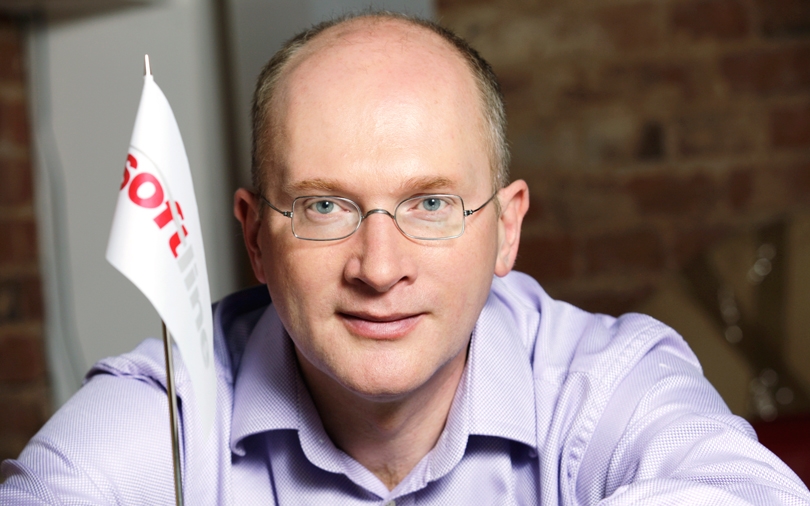At the beginning of November, Softline became the first classic IT company from Russia that went public. In this interview, Igor Borovikov, co-owner of Softline, tells RBC about the risks of the partnership with Microsoft and explains where the money from the IPO will go

At the beginning of November, one of the largest Russian IT companies—Softline—placed its global depositary receipts (GDR) on the London Stock Exchange. The company raised $400 million for development, and another $58.2 million went to its shareholders, who decided to sell part of their shares —Softline founder Igor Borovikov, as well as Da Vinchi and Zubr Capital funds.
Softline was founded in 1993 and initially focused on selling software licenses, primarily from Microsoft. Other key Softline partners are Adobe, Amazon Web Services (AWS), Apple, Cisco, Dell Technologies, Google, Hewlett Packard Enterprise, HP, IBM, and Oracle are also listed as major partners. Headquartered in London, Softline now operates in 53 countries, including India, Brazil, Malaysia, Vietnam, Colombia, and others.
Softline is the first classic IT company from Russia to go public. Igor Borovikov first announced his plans for an IPO back in 2007, but the placement was postponed several times due to financial recessions. In an interview with RBC, Igor Borovikov talked about why Softline was so persistent about the IPO, how will the raised money be used, and what might be the effect of the import substitution policy implemented by the Russian government.
"We considered the public company status as an advantage."
—Are you happy with how the IPO went?
—Yes, very happy. On the one hand, the market is positive now, but it is much less benevolent than it was at the beginning of the year or earlier. Investors don't invest in every IT company; they study the details meticuolously and evaluate its growth prospects. We've put together a balanced order book with a lot of knowledgeable long-term investors who had previously invested in our competitors. These are mostly large and medium-sized international foundations. We also see good demand from Russian retail.
—You've been going for it for more than ten years. Why was the company so persistent in going public?
—If you look at our global vendor partners, you'll that they are global public companies, and they prefer to deal with global public companies because those companies have the right principles, financial stability, etc. We saw this status as a great competitive advantage for customers, partners, and employees.
But it only makes sense to become listed on the stock exchange when you reach a certain size. Now we have reached a point where we are satisfied with the ratio of how much money we have raised to how much the shares of existing shareholders will be diluted. We see that the stock markets are now really ready for and interested in our type of companies and that everyone has come to the realization that the digital transformation, which we are supporting, is a very long-term trend. After the COVID-19 pandemic started, general words have turned into real action.
—You plan to direct a part of the raised funds to mergers and acquisitions (M&A). Companies in what fields and what countries are the most interesting for you?
—Geographic expansion is one of the three main points of our strategy. The digital transformation market is global in and of itself. In the next three years, our plan is to "open" up to 30 new countries, mostly in Asia, the Middle East, and Africa, both organically and inorganically, through acquisitions. Out of the $400 million that we raised, we plan to spend 80%, that is $320 million, on acquisitions. We have an M&A strategy with a current pipeline (the list of potential acquisition targets—RBC) of $1.5 billion. This is about 30 companies. Of course, not all of them will become real deals, but some of them will take place. By the end of our financial year, by March 31, 2022, we plan to close 2—3 deals that are now in the final stages. With M&A, we open new territories or strengthen our positions in other ones. We want to expand our service expertise in AWS, information security, and digital transformation services. Portfolio expansion is the second area of our strategy. We started by selling software licenses, then we expanded our portfolio with services, hardware, and cloud solutions. Our customers don't want a single fraction of digital transformation, but a complete end-to-end solution. Now the company employs 6,000 people: one-third of them are sales managers, and another third are people who provide services and help customers. We plan to increase their number from 2,000 to at least 5,000–6,000.
The third strategic direction is the sales channel development strategy. We started the business with direct sales, when managers talked to customers, then we added affiliate sales, e-commerce, and recently Softline Digital, a platform that allows you to do business in the cloud. I believe that in the future, IT will move to a self-service format. As now we communicate with a bank using a mobile app, the same will happen in the corporate segment in terms of IT: customers will access the platform and order the services and services they need from it.
—Some experts, when commenting on your plans for IPO, said that now the markets are overheated and most assets are being sold at an inflated price. As a consequence, those investors who invest in Softline will not benefit much from such deals. Do you agree with this opinion?
—I agree that the market for publicly traded global companies is really overheated. But we're not spending the money, we're investing it. We buy relatively small local companies with a turnover of $100–300 million. We see that this is a buyer's market. The average multiple at which we buy companies is 5–7 EBITDA. I wouldn't say it's a very overheated market. Their owners are willing to negotiate acquisitions and mergers, because, to have a future, they need to invest a lot of money in themselves.
—Softline history shows that all these years you explored new countries without any stock money.
—Yes, we can grow without the IPO too, but this extra money will accelerate our growth. Why is this very important to us? The market is consolidating now, and we want to be the company that consolidates the IT and digital transformation market in the segment of developing countries. Staying a local company is very, very difficult. It is much better for software developers to work in a large public company than in a small but local one.
Our competitors are global companies such as Softcat, Crayon, SoftwareOne, Softchoice. Our main difference from them is that we focus on emerging markets, while they work in developed markets. In emerging markets, we have access to talent: engineers, programmers, and service people. Therefore, we believe that our service business will grow much faster than that of our competitors.
—How do you think the market will look like in a few years when the process of consolidation is over or almost over?
—I believe that in the future, there will be several players in each country. One of them will work with the state segment, like Rostelecom in Russia, and the commercial market will be divided between one to three global players and one to three major local companies.
"The relationship with Microsoft is the foundation for our growth."
—Right now, almost 50% of your revenue comes from selling Microsoft products. Are you trying to increase the share of other areas in order to somehow reduce the risks of dependence on one vendor?
—As a company, we are mostly guided by the interests of our customers. Now an average corporate customer spends about 40-50% of their IT budget on Microsoft products such as Windows, Office, and Azure. When they go for Microsoft Exchange and Outlook email, the amount goes up to 50%. But the situation is dynamic: there are other players in the cloud market that compete with Microsoft, such as AWS, Google, Alibaba Cloud, etc. We develop relationships with them as well because we stand on the customer side. Moreover, if you take our competitors—Crayon, Softchoice, etc.—their share of Microsoft business reaches 60-70%. And investors love them, invest in them, and believe in them.
That said, the relationship with Microsoft is a foundation for us to develop in new countries. The corporation has a total of 300,000 partners around the world—and only ten global partners. We are one of them, and our main focus is emerging markets. Microsoft supports us as we enter new markets, gives us statuses and invests in our transformation. It's difficult for a Russian company to come to India or Brazil without such a background.
—If you look at the results of the financial year 2020, 39.5% of revenue comes from non-Russian businesses. Do you aim to increase this share? Is this some kind of a target?
—We certainly don't want to reduce our business in Russia. This country has given us everything. To build a company of the same format and scale anywhere else would be unrealistic. But if you look at the countries of our presence, you'll see that their market is 16 times larger than Russian. For example, the Indian market is twice as large as the Russian market, and the Brazilian market is 2.5 times larger. Probably the company will reflect this to some extent, and the share of Russia will fall. But this will happen because of active business growth in other countries. We now sell twice as many Microsoft products beyond Russia as we do within.
—Your corporate profile states that the share of Microsoft products in your turnover in Russia has fallen from 36% to 27% in the last 3-4 years. Is this the effect of import substitution declared by the authorities?
—We perceive import substitution not as a threat to ourselves, but as a unique opportunity. It's like French or Italian cheese, which disappeared from the shelves some time ago. On the next day, Russian and Belarusian cheese took their place. Did the retailers suffer from this? No. They even won, because Russian products have higher margins. As a commercial organization, we also benefit from import substitution. This is the point number one.
I think it is a very wise intention for the government to have its critical IT infrastructure built on Russian software and hardware. But we need to understand how to correctly define what is Russian software and hardware: whether it is something that has the "made in Russia" mark, or whether it is an open-source product (open-source software is distributed under a free license agreement: the user has the right to use the program for any purpose not prohibited by law and has access to its source code for analysis or customization—RBC). It seems right to me to pursue the Open Source way. We feel very calm and confident in this direction.
In absolute terms, in millions of dollars, our sales of Microsoft in Russia are growing—but our services and products from other vendors, such as Russian ones, are growing at a much faster rate. Therefore, the percentage of Microsoft's is falling. In markets where we have been present for a long time, we sell $3–4 of other companies' products and services for every $1 of Microsoft sales.
—Which Russian developers are you selling?
—All Russian software vendors: Kaspersky Lab, Dr.Web, ABBYY, etc.
—What share of your turnover comes from Russian government agencies?
—Less than 10%. We started with medium and small businesses, worked mainly in this segment, and then approached large corporate clients.
"Before the pandemic, IT was perceived as a cost center."
—As far as I understand, Softline was one of those companies that, if I may say so, benefited from the pandemic. What was the positive effect?
—The pandemic was a catalyst for digital transformation, and not only Softline won here, but probably this entire segment of the IT market. You can look at how much stock prices have risen over the past two years. Before the pandemic, IT was perceived as a cost center, which had to be reduced first during previous crises. Companies ceased buying new computers, new software, reduced the salaries of IT staff, etc. But in the current crisis, IT procurement volumes have skyrocketed. All budgets were cut, but companies still bought [video communication services] Teams, Zoom, remote workstations, cameras, etc. On the one hand, we won, because everyone rushed to buy it. But on the other hand, it is obvious that because of the pandemic, a number of organizations disappeared from the market altogether, especially small businesses.
—Was the increase in demand for your products a one-time event or does it still remain?
—It does. Conventionally speaking, you bought a cell phone, which you never had before. The first day you spend an hour in it, then two, then it grows to 8-9 hours, and then stabilizes. Now we are in a growth phase. People are starting to realize that the pandemic and new work format are here to stay. Imagine some traditional manufacturing company: how will it motivate people in this new reality? How will it communicate with them? How to understand whether a person suffers from burnout, or what they do at home? People need new HR systems to understand what employees are doing at home and increase their loyalty.
—Do you plan to launch new lines of business? Is there a plan to become a "trendy" IT company and attract a wider range of investors?
—Any biology textbook says that the animal world is divided into different segments, each of them having different species and subspecies. In general, they can be compared to the digital transformation market players. Accordingly, there are investors who invest in different segments of this market. Many invest in Microsoft, Facebook, Apple, but there also are those who find their niche and invest in it. Now, this segment of the market is quite popular, because everyone understands that digital transformation is a long-term trend. If an investor's goal is to make money, can they increase their investment tenfold on Microsoft securities over the interval of two years? Probably not. It's a great company, and it's growing, but niche companies like Softline or Crayon have seen their stock returns increase tenfold over the last three years. We are perfectly content with our niche. We understand that without this type of company, the future is not possible, so this "species" is here to stay.
—How much does the company spend on research and development (R&D)? How important is this investment for your business?
—Today's world is all about clouds, so it is impossible to do business without a digital billing platform: an automated system that allows you to serve customers in a pay-as-you-go (pay-per-use—RBC) subscription-based format. We have already spent more than $10 million on digital platform development and we will continue to invest in it. We also invest in services powered by such trendy technologies as data science, artificial intelligence, machine learning, etc. On average, we want to invest about $10–15 million a year in R&D. If you don't invest in this area now, you won't be able to do business in 2–3 years.
—While Softline was raising investments, before and after the IPO, you still retained control over more than 50% of the company's shares. Is this a point of principle for you?
—No, Definitely not. If you look at the current governance model, the company is now run by a board of directors, most of whom—four out of seven—are independent. Yes, I am a major shareholder, but the entire board and the governance system are structured in such a way that independent directors oversee my well-being as a shareholder.
—What country do you spend the most time in now? Will this change after the company goes public?
—In the current format, where we all work remotely, you can be in an office in Moscow, at a cottage, or anywhere else. I spend most of my time in Portugal now due to personal circumstances, but while I'm here, I always remain in touch with board members and top managers, who are also in different countries. I probably spend most of my time in Zoom and Teams—they have now become two new countries on the global map.
—Not planning to relocate to the UK?
—No. I really like living in Russia.
Read more on RBC:
https://www.rbc.ru/interview/technology_and_media/12/11/2021/618a185f9a794707ee920765?from=newsfeed









